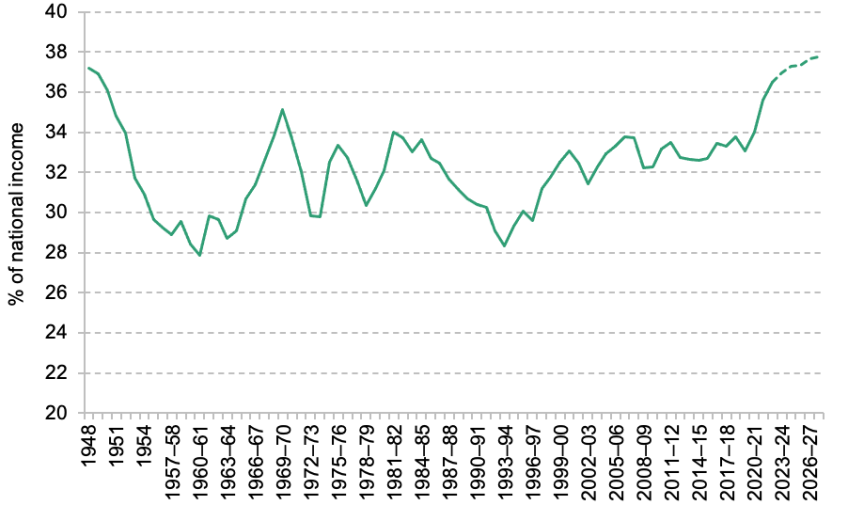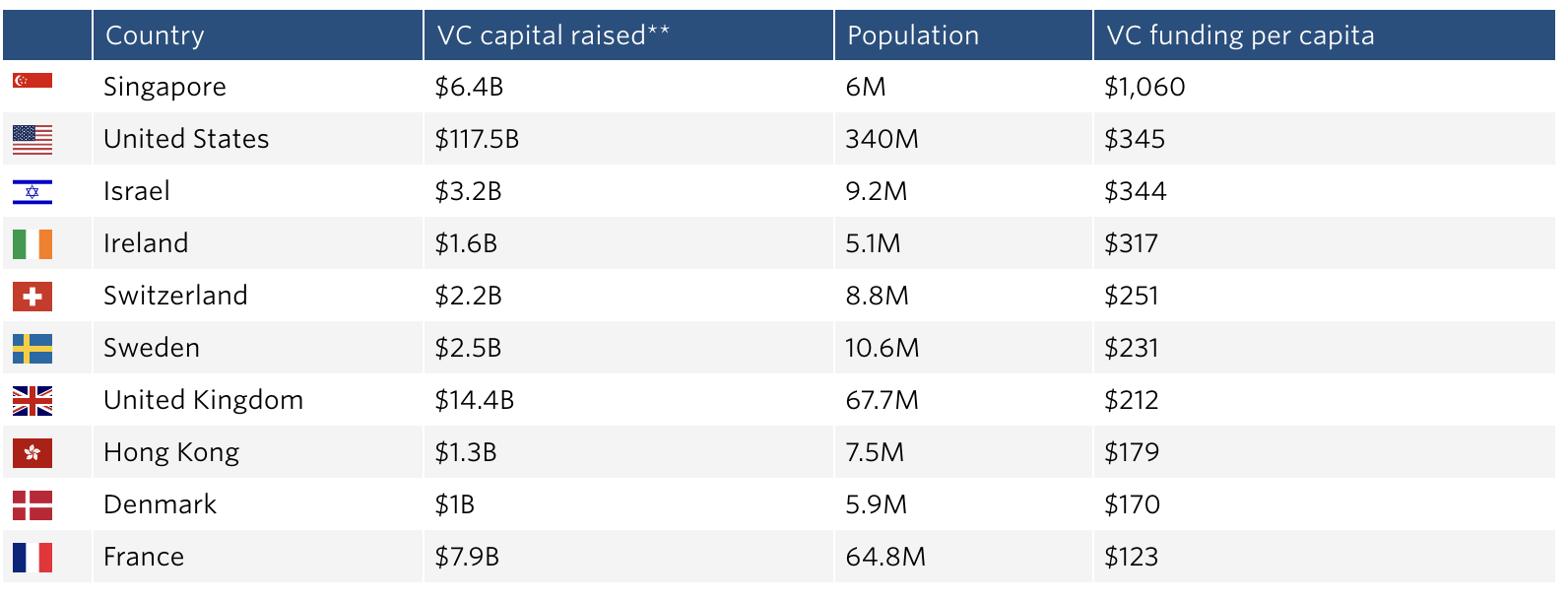Weekly Briefing: UK economy grows faster than estimated since Covid, property sales to strengthen & UK faces permanently higher taxes
This week, we explore several newly released reports covering pivotal economic developments.
This includes the UK’s better-than-expected post-pandemic economic growth, the potential of the UK’s all-time high tax levels being permanent, interesting insights into the countries with the most triumphant VC funding, and more.
UK Economy
UK economy grew faster than estimated since Covid
- The Office for National Statistics (ONS) published new estimates showing that the UK’s economy had grown faster since the start of the Covid-19 pandemic than initially thought.
- The figures indicate the economy has grown by 1.8% since the pandemic started, in contrast to the previous estimate of a 0.2% contraction.
- This revised data indicates that, since the end of 2019, the UK has seen faster growth than France or Germany. Their growth estimates are 1.7% and 0.2% respectively.
- In the first three months of this year, the economy grew 0.3%, up from the 0.1% previously estimated.
- In response to the revised data, Chancellor Jeremy Hunt stated: “We know that the British economy recovered faster from the pandemic than anyone previously thought, [proving] the doubters wrong. We were among the fastest countries in the G7 to recover from the pandemic and since 2020 we have grown faster than France and Germany.”
- With regards to international comparisons however, Samuel Tombs, Chief UK Economist at Pantheon Macroeconomics, said: “A stable picture might take some time to emerge, given that statistical authorities in other countries are revising their data too.”
UK facing permanently higher taxes, says leading think tank
- Tax levels in the UK are at their highest since records began 70 years ago, and the Institute For Fiscal Studies (IFS), a leading think tank, suggests they are unlikely to come down.
- In a recent report from the IFS, they state: “At the time of the last general election, UK tax revenues amounted to around 33% of national income. By the time of the next election in 2024, on current forecasts, taxes will amount to around 37% of national income – a level not sustained in the post-war period.”
- When compared to pre-2019 levels, the Government will collect upwards of £100 billion more in taxes next year according to the IFS.
- The IFS point out that the UK Government is currently raising more in tax revenue, as a percentage of national income, than at any time since the 1940s.
- This has been driven, in part, by tax-raising measures such as an increase in the main rate of corporation tax, the energy profits levy and freezes to various income tax and National Insurance thresholds.
UK tax revenues as a percentage of national income

Note: Calendar years prior to 1955–56. Values denote national account taxes. Dotted line denotes March 2023 forecast.
Source: Office for Budget Responsibility, public finances databank via the IFS “This will be the biggest tax-raising parliament on record” report.
Global Economy
Asia faces one of the worst economic outlooks in half a century, World Bank warns
- The World Bank has cut its forecast for China’s growth next year, warning that east Asia’s developing economies are set to expand at one of the lowest rates in five decades.
- China’s 2023 growth target of around 5% is already one of the lowest for decades.
- The World Bank now expects China’s economic output will grow 4.4% in 2024, down from the 4.8% it estimated in April 2023.
- It also downgraded its 2024 forecast for gross domestic product growth for developing economies in east Asia and the Pacific to 4.5%, down from its prediction of 4.8% in April 2023 and below the 5% expected this year.
- These projections show that the region is set for its slowest pace of growth since the 1960s (excluding extraordinary events such as the Covid pandemic, the Asian financial crisis and the 1970s’ global oil shock).
- Aaditya Mattoo, World Bank’s Chief Economist for east Asia and the Pacific, said: “[It was expected that China’s rebound from strict pandemic controls would be] more sustained and more significant than it turned out to be.”
- The Bank points to Chinese retail sales dropping to below pre-pandemic levels, stagnant house prices, increased household debt and lagging private sector investment as impacting factors.
Impact investing
UK social impact investments climb 18%
- Against a backdrop of rising interest rates and the cost of living crisis, investment into tackling social issues in the UK continued to grow last year, according to Big Society Capital’s most recent annual report.
- The amount invested into addressing social issues increased to £9.4 billion in 2022, up from £7.9 billion in 2021.
- Big Society Capital CEO Steven Muers said: “The continued growth in social investment in this challenging environment is welcome and demonstrates an increasing investor appetite for creating positive change to people’s lives. But evidence shows that significantly larger amounts of private capital are badly needed to help tackle social problems.”
- Social impact investment has increased more than ten-fold since 2011, when it was £830 million.
Venture capital
Singapore beats larger markets for VC funding per capita
- Singapore is the country with the most venture funding per capita in 2023, according to PitchBook.
- Startups in Singapore have raised a total of $6.4 billion, and based on its population of 6 million, it gained $1,060 in VC funding per person so far this year.
- The US took second place with $345 per person, whilst the UK ranked seventh with $14.4 billion in VC capital raised, working out at $212 per person.
- Out of the top 10 countries for VC funding vs. population – based on those that have raised at least $500 million in funding with a minimum of 100 deals – 60% are European nations.
Top countries by VC funding vs. population in 2023

*As of Sep. 26, 2023.
Note: Countries with $500M+ in VC capital raised and 100+ VC deals.
Source: PitchBook data/World Population Review.
Property
UK property sales activity set to strengthen
-
- Propertymark’s latest Housing Insight Report suggests signs of an increasingly positive momentum in the UK property sector, as sales rise and more new homes come to the market.
- The number of new properties for sale in August was 29% higher than the month prior.
- The average number of new prospective buyers registered per member branch is up to an average of 81 in August 2023, from 64 in July 2023.
- In the report, Propertymark CEO Nathan Emerson states: “With inflation and interest rates remaining higher than previous years, market conditions remain demanding. We are however likely to be reaching the peak of that curve and are potentially starting to see very early signs of forward motion again.”
A Final Note
Whilst it is evident that many challenges do persist – the threat of permanently higher taxation, in particular, should serve to highlight the importance of having a tax-efficient investment strategy in place – there is some clearly positive news regarding the UK’s economic growth, an uptick in social investing and tentatively optimistic housing supply and demand figures.
%20(3)%20(2).jpg)









